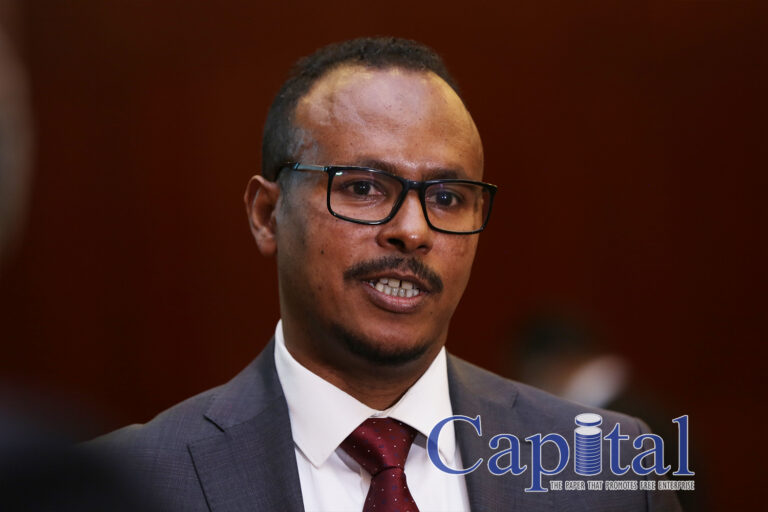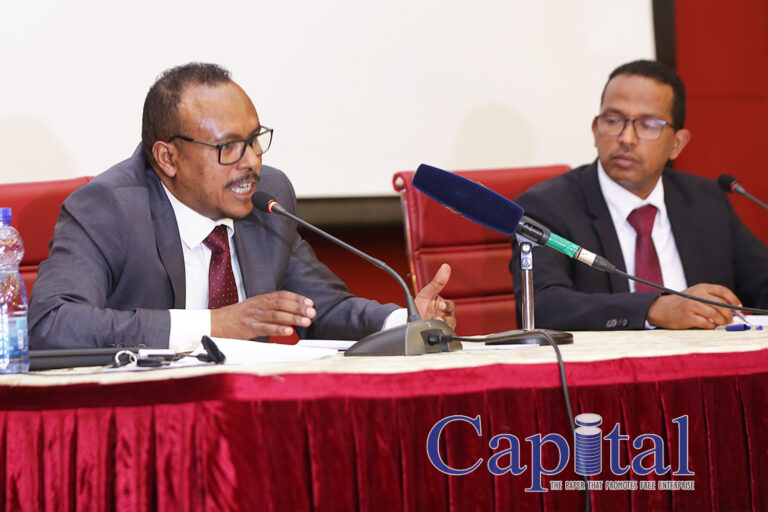BGI Ethiopia introduces its first ever non-alcoholic beverage -SEN’Q into the malt drink market. BGI is working day in and day out, in an effort to put Ethiopia alongside the international standard of having an extensive list of beverages i.e. diversifying the market. Despite the difficulties that have come out of COVID-19, BGI is working tirelessly to strengthen the severely disrupted economy. Accordingly, it has done more besides managing daily affairs and releasing Ethiopia’s first ever brown beer, Doppel; the company has just introduced this new and eccentric Non-Alcoholic Beverage -SEN’Q. “Enriching our bodies with vitamins that are essential to our health, ̈SEN’Q is crafted with the traditional principle of motherly love and care through state-of-the-art brewing technology,” reads a statement from BGI. SEN’Q is a mixture of Caramel, Vanilla and Ethiopian coffee fortified with Vitamins.
Reforming the logistics sector
A regulation to open up the multimodal sector for private actors has been tabled to the Council of Ministers.
Ethiopia in 2011 had introduced the multimodal scheme which in logical sense unveiled a monopolistic approach in the logistics business. This was a result of the amalgamation of the Public Logistics Enterprises; that is, Ethiopian Shipping Lines, Dry Port Service Enterprise, Comet Transport and Ethiopian Maritime Transit Service to form the Ethiopian Shipping and Logistics Services Enterprise (ESLSE).
Since then the private logistics actors have expressed their concern stating that the decision made would totally alienate them from the sector. On the other hand Government has argued that it would open the sector to the private actors without specifying the timeframe of when it will do so. 
According to the information that Capital obtained from the sector actors concerning any improvements on the sector, they affirmed that, the National Logistics Transformation Council has approved the draft regulation that is supposed to be ratified by the Council of Ministers. The draft regulation seeks to have a more open multimodal scheme, which offers the transportation of goods through different means of shipping including rail and road under a single contract.
Mekonnen Abera, Director General of Ethiopian Maritime Affairs Authority (EMAA), told Capital that the regulation has already been sent to the Council of Ministers for approval.
“The sector has received attention from the government,” he said.
He expressed that there are about 100 intervention areas awaiting response in the logistic sector, of which the multimodal reform is a major part. “One of the top areas that the logistics council which is comprised of relevant government bodies and private sector is keenly focused towards is the multimodal scheme,” he added.
In addition, he stated that the sector will be open to limited and capable developers. Furthermore, Ethiopian Logistics companies may come together in a joint venture to form strong entities so as to be part of the business.
Currently, the major share of import commodities is managed under the multimodal scheme. Private freight forwarders and shipping agents have however claimed that it is affecting their business.
On an aim to relax the sector and in response to the private actors’ claims, the government had proposed a directive that allows private logistic actors to operate under ESLSE in a subcontract level. This however has proved to be non-effective in calming the situation.
Under the directive issued a couple of years back, a private sector was allowed operation under ESLSE if they met the requirements such as; 5,000 square meters of transit plot and a capital of 10 million birr.
When the multimodal law was originally issued about a decade ago under the Ministry of Transport it indicated that any company that demanded direct involvement (Not under sub-contract) should have a capital of 100 million birr amongst other criteria. When Mekonnen was asked to disclose whether this was amended in the draft that was tabled to the Council of Ministers, he was reluctant to disclose further information on the matter.
The logistics sector is one of the areas that the government targets to open for local and foreign investors and to that effect it has disclosed that in its reform plan it plans to open some of the monopoly businesses to the private sector and foreign investors
As per the government’s decision, the involvement of foreign investors on the logistics sector is limited to up to 49 percent.
So far, CMA CGM and Bolloré Africa Logistics, both French companies, have agreed to get the maximum share on two local logistics companies.
The logistics sector of Ethiopia is one of the bottlenecks for its economic growth. The government has been trying its best to modernize the sector but the change is not as required.
On Thursday 1st of October, the first transport policy and logistics policy have been discussed with stakeholders.
Mekonnen says that these policies are crucial when it comes to a better strategy solution both in improving the logistics sector and in the creation of a conducive business environment, with business attractions and rich investment flows which the government needs.
Apart from the multimodal scheme, the dry port investment is another area the government wants to open for local investors.
According to sources, the new regulation is expected to be approved by the Council of Ministers in the coming few weeks.
The National logistics sector policy mentioned the private sector to be competitive. “A number of private investors have showed interest to involve in the logistics service sector; however, it has not been possible to entertain their interest because of structural and legal framework limitations. The involvement of the private sector will make the logistics sector competitive, effective, profitable and thus, contribute to the growth of the economic sector,” the policy added.
The National Logistics Sector policy, mentions that private actors introduce good competition. It states, “A number of private sectors have shown interest in the involvement of the logistics service. However, it was not possible to entertain their interest because of the structural and legal framework limitation. The involvement of the private sector will however make the logistics sector competitive, effective, more -profitable thus contributing to the growth of the economic sector.” It adds that in the basis of policy formation, the involvement of private actors was accounted for.
The transport policy has also considered the integration of different modes of transport, expansion of infrastructure, making the sector competitive, encouraging the private sector actors, mobilizing required funds and integration on the best use of land for the transport sector.
One of the biggest private logistics players, which demanded anonymity, told Capital that for the country with more than 110 million people and huge economic potential requires at least four multimodal operators, because it is crucial to support the total population in different arena.
The logistics player informed us that the government is working to open the sector in the coming few months which will have a good effect to the logistics sector economically.
“Liberalization is a crucial factor for importers, exporters, manufacturers and input importers. This is because under the uni-modal scheme documentation work is done separately which causes cargo to be stalled in the Djibouti port regardless of the shipments arriving early from Dubai or Saudi,” he said.
“We are in foreign currency scarcity and cargos increasing in demurrage at ports continually affects us but if we properly approach the multimodal scheme cargos shall be immediately be transported to their respective countries as paper work is finalized here,” the logistics operator said.
“When transportation takes few days it results to better pricing of goods and efficient use of the railway system which benefits the general public. Furthermore, it reduces cost of logistics thus improving the enterprises activity,” he added.
Government leaning towards a hybrid model for Ethio-Telecom bid
Despite the decision is not yet officially given the government may take the hybrid model of process to include two more telecom operators.
The government is holding different and frequent public consultation on the way of liberalization and partial privatization of Ethio Telecom. For instance two consultation with different groups have been conducted in this week the event that organized by Ethiopian Communication Authority (ECA), and Ethio Telecom and Ministry of Innovation and Technology.
Experts who followed the process of liberalization told Capital that the government is expected to implement the hybrid model to select the two new operators.
So far the government is under discussion on three options; auction, beauty contest and hybrid models for the process to select the companies.
“based on the discussion that we participated it seems that the third model has get more good turn than the first two, which I think is the best way to give spectrum,” one of the sector expert who attended consultation that held a week ago at Ministry of Finance (MoF).
At the discussion the organized by MoF a week ago some of the participants expressed their expectation that the process will aligned with the hybrid.
“It seems that the process will be held under hybrid model,” Levi Girma, General Manager of BravoCom said that the meeting.
Hybrid is the model that includes the auction plus beauty contest. A beauty contest also known as public interest franchising or menu auction is a selection process where the regulatory agency awards the licenses to the operators that it perceives to be most suitable with the measurement of the proposed strategy of a company to do when it involve on the market.
An auction on the other hand is nothing less than a process where the firms who bid the most win the license.
Government sources also gave a hint to Capital that the process is expected to take via hybrid.
Balcha Reba, Director General of ECA, told Capital that the issue is under discussion that will be disclosed in the near future.
The literature and the idea to either use a beauty contest or an auction when awarding spectrum originates from the broader literature on public franchise bidding that was first suggested as a regulatory strategy in late 1960s.
Experts in the sector suggests that using the fusion of the two would be preferable for such bidding process to meet both the revenue expected to generate and the target that the government want to see when the sector is opened for new operators.
12 companies including Vodafone, Snail Mobile, Telkom, etisalat, Liquid Telecom, Orange, Kandu Global Telecom, Axian, and MTN have expressed their interest to be part of the two operators in the country.
International Finance Corporation, Roland Berger Gong, Coleago Consulting, Jones Day, and Earnest and Young are well known international companies consulting the process via different directions like finance, legal, media and communication and technical.
In related development on the discussion that organized by ECA on Monday September 28 participants recommended that the government to allow to include local investors to invest on telecom tower development.
At the beginning the government has been targeted to open the telecom tower development for interested infrastructure developers whether it is local or foreign. Since its announcement several foreign companies have been expressed their interest to invest on it.
However the government have paused its former plan for unspecific period and stated that the new coming telecom operators or Ethio Telecom will invest in the sector.
Ethio Telecom has been also argued that it had invested huge amount of dollar to develop the infrastructure in the past and it will be affected when the government allow new infrastructure companies to invest.
Currently there are about 7,300 telecom network towers throughout the country that owned by Ethio Telecom and it has also stated that it is expanded its system every time.
According to the plan until the new two comers develop their own network system they shall lease system from Ethio Telecom infrastructures. Besides that ECA has drafted Telecommunications Infrastructure and Collocation directive that impose operators to share their infrastructure each other.
National roaming scheme will be also implemented on the sharing of infrastructure.
on the discussion that held with legal experts, infrastructure developers and academia one of the participant said that he accepted the decision of the government to hold the opening up of the infrastructure sector for not telecom operators since the state enterprise already invested huge amount, “but the sector at least to be opened for local investors to build their capacity.”
Balcha, who appreciated the recommendation, said that there are interested local investors like steel industries that are currently supplying input for Ethio Telecom to invest in the sector. “The government may consider the recommendation,” he added.
ECA’s new pioneering directive awaiting ratification
Ethiopian Communication Authority (ECA), a key leader on the liberalization of the telecom operation has disclosed that it is drafting several directives to ratify under proclamation to provide for federal administrative procedure 1183/2020 that enforce federal offices to get approval from Federal Attorney General to issue any directive.
Balcha Reba, Director General of ECA, said that his authority might be a pioneer in applying the federal administrative procedure proclamation to issue directives on the way to opening up the telecom industry for additional operators.
The proclamation on its preamble indicated that the proclamation is required to regulate Administrative Agencies to refrain their intervention against the peoples’ rights and Interest. This is necessary as it guarantees administrative justice by promoting a culture of transparency and accountability through legally establishing a system of judicial review for persons who might be aggrieved by acts of administrative agencies, in their rule-making and decision-making capacities.
The proclamation obliged the government offices to follow different process before enforcing any directive. It states that at the time of adopting a directive, an administrative agency shall keep a record/file containing the subject matter of the directive considering the timeline of major steps such as; an information regarding the status of the draft directive in the process of adoption, notices published in relation to the adoption of the draft directive, a period of time with in which the public may comment on the draft, comments received and positions taken regarding the comments.
“Our establishment proclamation by default is obliged to communicate to stakeholders before issuing a directive, while since last October we have been engaged in drafting different directives,” Balcha told Capital.
He said that the recently issued proclamation has also forced the public agencies to follow different procedures unlike the past when they followed a directive issued ECA.
“We believe that we are the pioneers on applying the proclamation. We have been engaged on different consultations and notifications of the draft directives,” Balcha said.
He added that ECA is using its website as an avenue for direct announcements to call for consultations as well as undertaking online discussions. The draft proposals are also posted on the website.
“An administrative agency shall solicit comments from relevant administrative agencies and other stakeholders by sending the draft it publicized,” the federal administrative procedure proclamation explained.
“After the expiry of the date for receiving written comments, the agency shall organize a public forum open for all interested persons and gather inputs,” it added .This is an indicator that the agency shall ensure enough time is allotted for different views to be aired.
According to the proclamation, prior to ratification of a directive, the agency shall send the draft to the Federal Attorney General for a conclusive opinion.
The directive is supposed to finalize a process of reiteration at the attorney office for ratification. “The Attorney General shall publicize to the pubic a filled directive with its explanatory statement and the date of notifying its registration,” the proclamation stated.
National Bank is not duty bound to implement obligations when it enacts directives concerning exchange rates, interest rates and other similar secret issues of the country. The proclamation might not be applied for security and emergency events since going through all the requirements takes time which is a limiting factor during an emergency.
The proclamation may not be applied where the issuance of advance notice may be contrary to Public Interest or when the issuance of notice may undermine the implementation of the directive.
According to the proclamation, an agency may incorporate, by reference in its rules, all or part of directives or code of conduct that has been adopted by another agency/body where these matters fall within its scope of power.
ECA, which is busy on undertaking the process to open additional two service providers with the support of Ministry of Finance, has tabled and discussed on several directives besides developing a regulation that shall be ratified by the Council of Ministers.
Telecommunications Interconnection Directive, Telecommunications Infrastructure and Collocation Directive, SIM Card Registration Directive, Lawful Tariffs Directive and Competition Directive are some of the draft directive that are under consultation.





